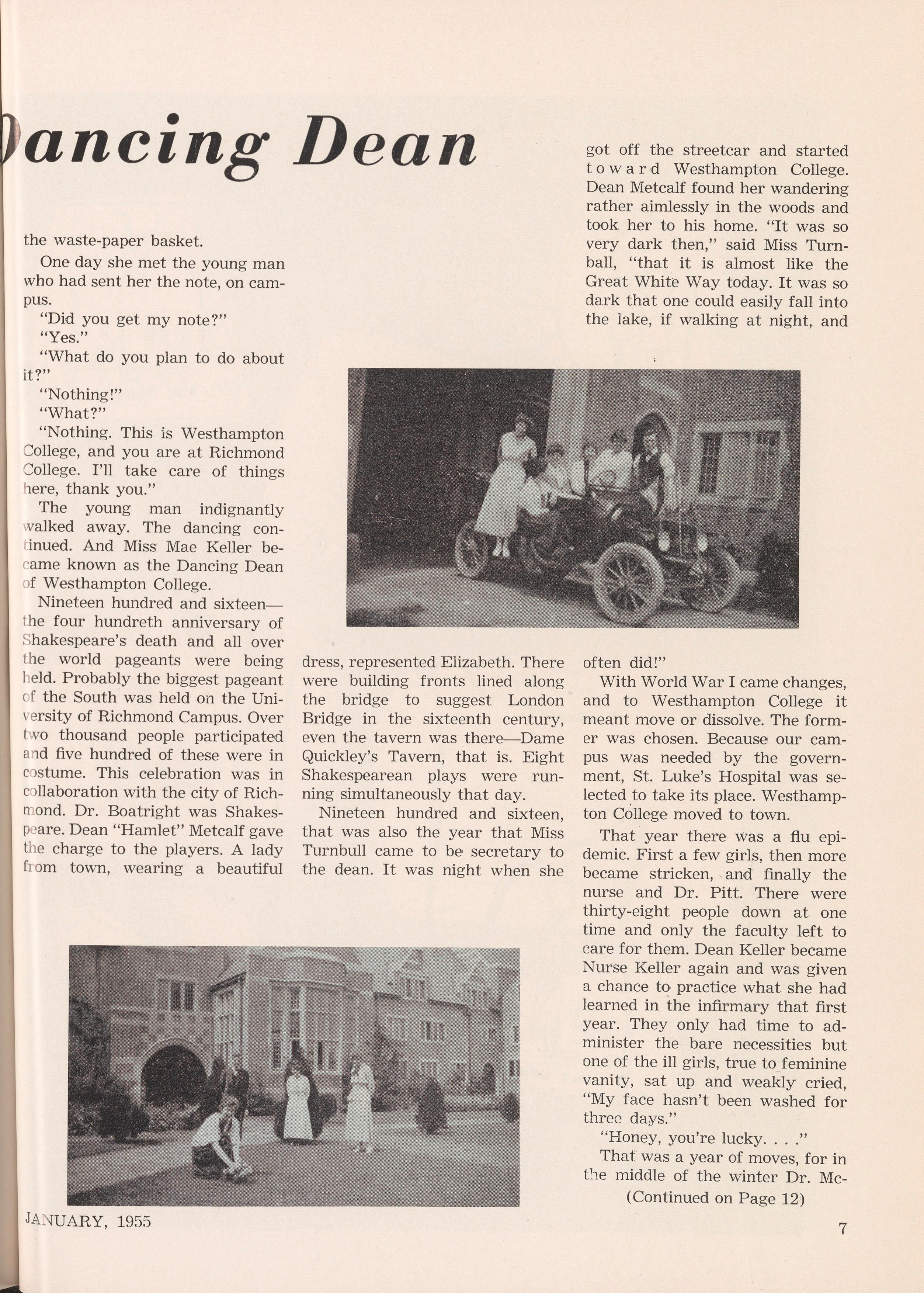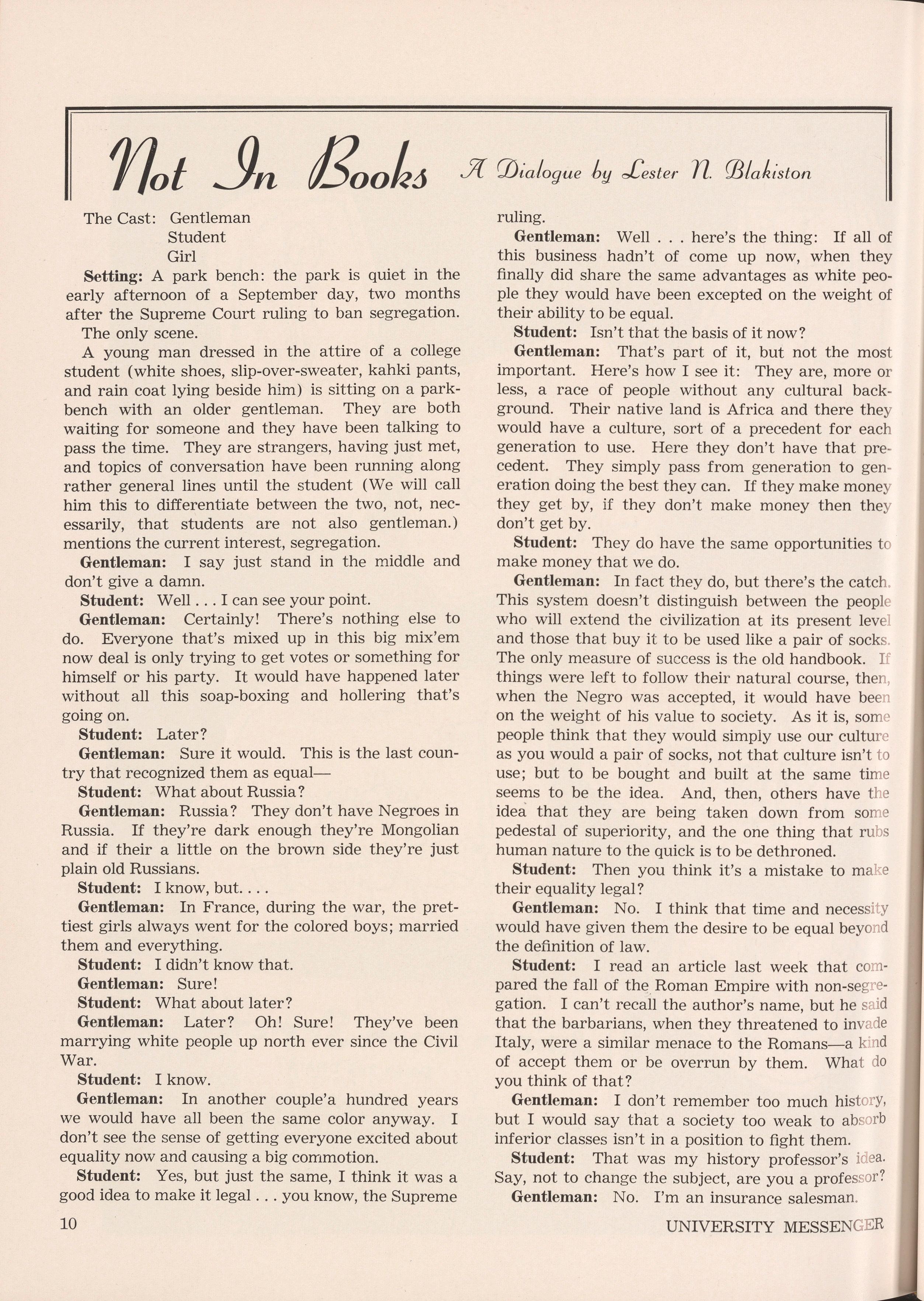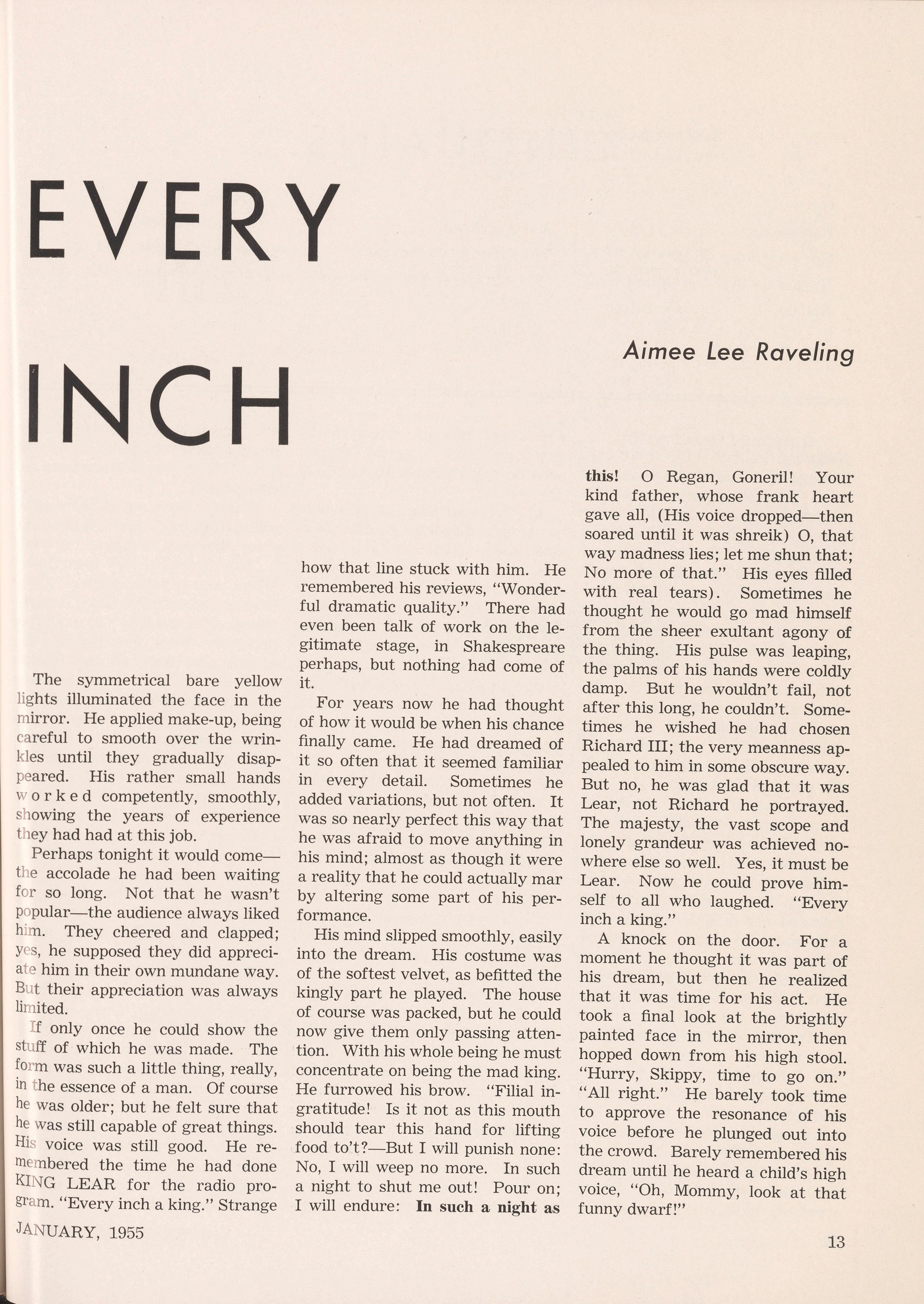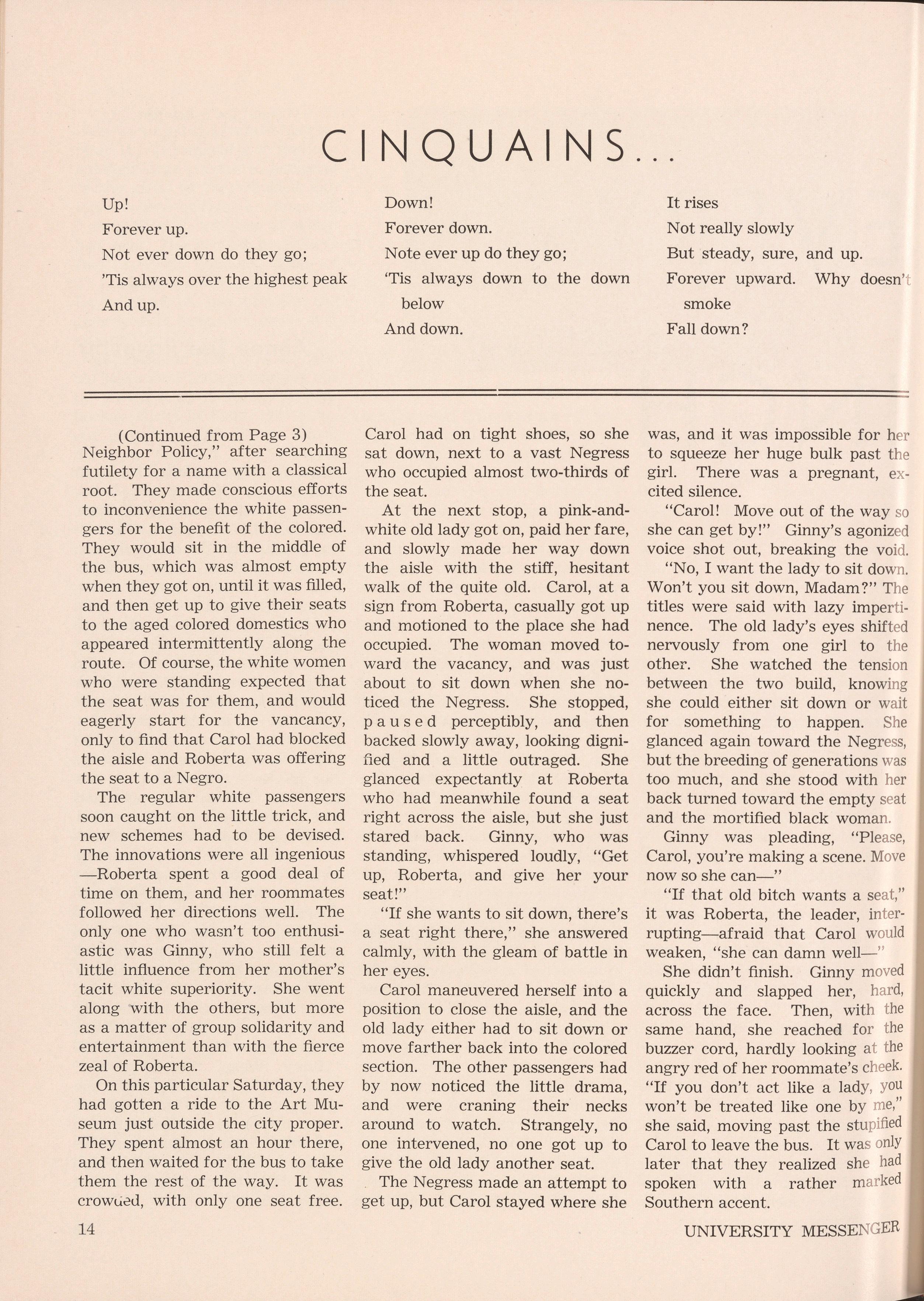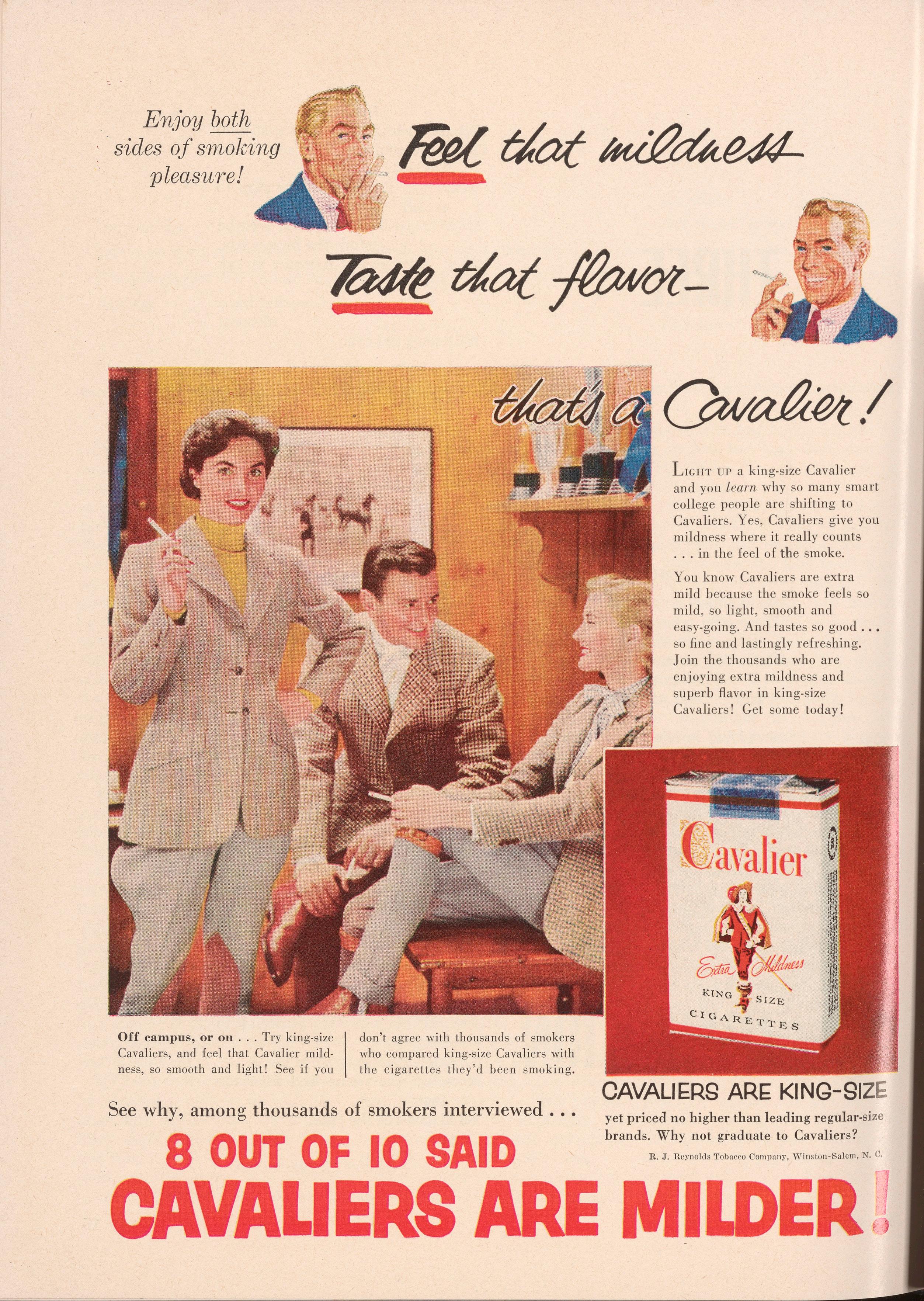..J( ClJialog«e by £ester n. (B/akiston
The
Cast: Gentleman Student Girl
Setting: A park bench: the park is quiet in the early afternoon of a September day, two months after the Supreme Court ruling to ban segregation.
The only scene.
A young man dressed in the attire of a college student (white shoes, slip-over-sweater, kahki pants, and rain coat lying beside him) is sitting on a parkbench with an older gentleman. They are both waiting for someone and they have been talking to pass the time. They are strangers, having just met, and topics of conversation have been running along rather general lines until the student (We will call him this to differentiate between the two, not, necessarily, that students are not also gentleman.) mentions the current interest, segregation.
Gentleman: I say just stand in the middle and don't give a damn.
Student: Well ... I can see your point.
Gentleman: Certainly! There's nothing else to do. Everyone that's mixed up in this big mix'em now deal is only trying to get votes or something for himself or his party. It would have happened later without all this soap-boxing and hollering that's going on.
Student: Later?
Gentleman: Sure it would. This is the last country that recognized them as equal-
Student: What about Russia?
Gentleman: Russia? They don't have Negroes in Russia. If they're dark enough they're Mongolian and if their a little on the brown side they're just plain old Russians.
Student: I know, but ....
Gentleman: In France, during the war, the prettiest girls always went for the colored boys; married them and everything.
Student: I didn't know that.
Gentleman: Sure!
Student: What about later?
Gentleman: Later? Oh! Sure! They've been marrying white people up north ever since the Civil War.
Student: I know.
Gentleman: In another couple'a hundred years we would have all been the same color anyway. I don't see the sense of getting everyone excited about equality now and causing a big commotion.
Student: Yes, but just the same, I think it was a good idea to make it legal ... you know, the Supreme
ruling.
Gentleman: Well ... here's the thing: If all of this business hadn't of come up now, when they finally did share the same advantages as white people they would have been excepted on the weight of their ability to be equal.
Student: Isn't that the basis of it now?
Gentleman: That's part of it, but not the mos t important. Here's how I see it: They are, more or less, a race of people without any cultural background. Their native land is Africa and there the y would have a culture, sort of a precedent for eac h generation to use. Here they don't have that pr ecedent. They simply pass from generation to generation doing the best they can. If they make mone y they get by, if they don't make money then the y don't get by.
Student: They do have the same opportunities t make money that we do .
Gentleman: In fact they do, but there's the catc h This system doesn't distinguish between the peop le who will extend the civilization at its present lev 1 and those that buy it to be used like a pair of sock s The only measure of success is the old handbook. If things were left to follow their natural course, th en, when the Negro was accepted, it would have bee~ on the weight of his value to society. As it is, some people think that they would simply use our cultu re as you would a pair of socks, not that culture isn't to use; but to be bought and built at the same ti me seems to be the idea. And, then, others have t he idea that they are being taken down from some pedestal of superiority, and the one thing that r ubs human nature to the quick is to be dethroned.
Student: Then you think it's a mistake to m a ke their equality legal?
Gentleman: No. I think that time and nece ssity would have given them the desire to be equal bey ond the definition of law.
Student: I read an article last week that compared the fall of the Roman Empire with non-s egregation. I can't recall the author's name, but he said that the barbarians, when they threatened to invade Italy, were a similar menace to the Romans-a k;nd of accept them or be overrun by them. Wha t do you think of that?
Gentleman: I don't remember too much hi st ory, but I would say that a society too weak to a bsorb inferior classes isn't in a position to fight them.
Student: That was my history professor's ictea. Say, not to change the subject, are you a profe ssor?
Gentleman: No. I'm an insurance salesma n . UNIVERSITY MESSE NGER
Student: You seem well informed.
Gentleman: I just read the papers and talk to people. Nearly sixty per cent of my customers are Negroes and they're as good as poor people can be.
Student: Are they all poor?
Gentleman: Not at all. Average people trying to keep their heads above the surface. I talk to them about segregation. I haven't said anything today that I wouldn't, or haven't said to them. Most of 'em have pretty g ood ideas about these things.
S t udent: I sure had you picked for an instructor, or maybe an adviser.
Gentleman: I'm an adviser alright, but if you follow my advice you buy insurance; all you can afford.
Student: That's business I guess.
Gentleman: Sure is. We have to eat. Which r eminds me, I'm waiting for my partner to have lun ch with me. He's a colored fellow, heck of a nice fellow, too. When I first started with this company they put me over in his territory, I got along so well they never transferred me. He's a good man, but, they all are if you just try to under stand them.
Student: How do they feel about segregation?
Gentleman: They want the rights that they think t hey deserve, we all do. If we think we're not gett ing what's coming to us, we get mad. They feel ex actly the same way.
Student: I mean what do they say?
Gentleman: That they're equal, they fought for t his country, they didn't ask to come here; but now t hat they're here they want to be treated fairly, the sa me things we would say.
Student: I guess the only r eal way to understand ~h em is to talk to'em.
Gentleman: That's the only way. It's not all in ooks. By the way, what grade are you in?
Studen t : Freshman.
Gentleman: Fir st year, huh? Well, you'll be t h rough before you know it. Just remember as you go, it's not all in books. One of the major faults I f nd with some college people, is when they finish hool, when they're really in a position to learn mething, they just stop . Can't imagine that there's a ything beyond the books they left behind. Don't c.1r e either.
S t udent: I know.
Gentleman: Some of the best men I know are colleg e graduates, but when it comes to something like segregation, for example, they can't understand w•1ere the conflict is. They know that Negroes have al .vays b een considered slaves, laborers, and thieves s they think that they should always be considered ju,,t that. Not only college people don't misundersb n d, other prominent men in this country are just as b ad, probably worse. They stand up in church, or
J N UARY, 1955
political offices, or before committees, and rave about equality, but let them be on a bus and have a Negro sit beside them, and they're enraged. What they forget is exactly what they should remember, or, maybe they never learn about what people do; but only about what they should do. I don't know.
Student: You seem to.
Gentleman: I know that all the laws in the world can't replace truth, if anything they do well to imitate it. Truth isn't put in books to remain true forever. Truth today can be the biggest of all lies tomorrow, and it's because what is true is what fits soundly with what we already consider true. What was true seventy-five years ago of Negroes has changed today. They still have a long way to go, but in terms of culture, we didn't get what little we have over night.
Student: I know. I'd sure like to have a chance to talk to them about how they feel; I never have.
Gentleman: Why don't you?
S t udent: I never thought too much about it.
Ge ntleman: There's no time like now.
S t udent: But where?
Gentleman: You could come with me this afternoon
Student: Hey!
Gentleman: Sure. Doesn't look like my partner's coming. You'd be good company and learn something to boot.
Student: I really would like to.
Gentleman: Come on.
Student: I will if you're sure I won't be in the way.
Gentleman: Not at all. Who are you waiting for?
S tudent: A girl, but it doesn't look like she's coming.
Gentleman: Let's go, then.
(They get up and start to leave the stage. A girl comes on the scene.)
Girl: Hi there! Where are you off to?
Gentlem:l.n: There's your friend.
Student: If you still don't mind, I'd like to talk with some of your customers.
Gentleman: .. Not at all.
Student: (Looking back at the girl) Hi! Where you been? ( Still walking) .
Girl: I had to see my math teacher after class. Where're you going?
Studen t : To collect some information for my term paper.
Girl: Aren't you still writing on segregation?
Student: I sure am.
Girl: Well, aren't you going to the library to do some research?
Student: I'm going to get it first hand. (Exit student running to catch up with his friend.)
Girl: .. Men! They're all crusaders ... (Exit.)
(Continued from Page 7) Guire returned and wanted his hospital. It was impossible to find one building large enough to house all of the girls, so they divided into four houses within a range of twenty blocks, only one of which had heat. The central house was that of T. C. Williams, home of T. C. Williams who gave us the Law School. A bus brought the girls to this house for meals and classes.
The athletic field was on the old Richmond College campus not far away. Clad in bloomers with hockey sticks in hand, the vigorous girls used to walk up Grace Street to the field. The ladies of the neighborhood began to whisper and eventually stated very firmly that they considered this to be indecent exposure of the highest degree. So the girls took to the alley!
Back at the University of Richmond, the girls found that the war had not left their campus unchanged, for there was left here the Red Cmss Building. This building became the combination Assembly Hall, gymnasium, dramatics and music building . It was not unusual to walk in at any time and find girls practicing a play on the stage, others playing basketball, and still others taking piano lessons.
The girls were delighted at having the Fine Arts Building, Gymnasium and Auditorium. They became skilled in avoiding the padded posts which rose at intervals along the basketball floor, but it became embarassing when other schools began to refuse to play W. C because it didn't seem worth the bruises they got from the poles. We had to borrow the Richmond College Gym then, until the alumni raised $50,000 toward th e building of Keller Hall.
During the early years there was a freshman banquet held every fall in one of the hotels in town. Miss Keller always chaparoned because no one else would. This was a joint function of W. C. and R. C. and soon the sophomores of Rich12
mond started lying-in-wait for the freshmen, grabbing the boys as they approached the lake and throwing them into it. Being afraid that one of the girls might get hurt she decided to charter buses instead of using the streetcar. As the three buses returned from the banquet one year, the boys barricaded the back gate and began to throw rocks Windows were broken . One girl was cut. The sophomores s c r e a m e d for the freshmen to g et off, they would accompany the girls the rest of th e way Miss Keller rose to full size and full indignation and very firmly told them to leave, and they didn't need much persuasion.
The next day she informed the trustees that she would chaperone no more freshman banquets and suggested that their wives take over. There were no more freshman banquets
During World War II the same thing happen e d to Richmond College that happened to all men's schools. The number of students decreased to the extent that one dorm easily held all of the men. Now Westhampton, in complete rever se, was over-flowing. Where would all the girls live? Thomas Hall, of course The freshmen were designated to go because the upper classmen refused to give up the luxury of fine living ( ?) . For two years Westhampton girls inhabited the Richmond Campus. There were the usual joint classes but strict discrimination was pra c-
ticed in regard to dining rooms.
Nineteen hundred and fort y seven saw the third buildin g ri s on the hill. The new dormatorythe pride of the school. It w a s called South Court, and the ol dorm, which had never had a name apart from that of the scho ol, was called North Court.
Miss Keller had a ccepted h er challenge and had vitally help ed in the building of Westhampt on. and leaving it in an atmosphere of desire for growth she retired in 1946. She retired, but she did n 't leave Westhampton. Today she lives in the deanery near the Ch apel, and we often s ee her walk in g in the sun on a bright afternoo na small lady, with grey hair t h at we mi g ht almost overlook , but there is a spirit about her we cannot for g et. That spirit is a spirit of interest, of concern, as if she is a part of us. And truly she i s, if W esthampton is a part of us.
"No matter how little we h ave had in material things we'v e always had a wonderful spir it I hope that it will prevail. Don 't let us. just because we have all t hese things, unvalue what earlier girls contributed to the college
"The first year we emph a sized the spirit of democracy whic h h as persisted through the year s. This is something I'd hate t o see change."
She reemphasized the te r m "spirit of democracy" and t h en it was that I knew what made esthampton spirit unique.
UNIVERSITY MESSE NGER
CINQUAINS
Up!
Forever up.
Not ever down do they go; ' Tis always over the highest peak
And up.
(Continued from Page 3)
Neighbor Policy ," after searching futilety for a name with a classical root. They made conscious efforts to inconvenience the white passeng ers for the benefit of the colored. They would sit in the middle of the bus, which was almost empty when they got on, until it was filled , and then get up to give their seats to the aged colored domestics who appeared intermittently along the route. Of course, the white women who were standing expected that the seat was for them, and would eagerly start for the vancancy , only to find that Carol had blocked the aisle and Roberta was offering the seat to a Negro.
The regular white passengers soon caught on the little trick , and new schemes had to be devised. The innovations were all ingenious -Roberta spent a good deal of time on them, and her roommates followed her directions well. The only one who wa sn't too enthusiastic was Ginny, who still felt a little influence from her mother's tacit white superiority. She went along with the others, but more as a matter of group solidarity and entertainment than with the fie rce zeal of Roberta.
On this particular Saturday, they had gotten a ride to the Art Museum just outside the city proper . They spent almost an hour there, and then waited for the bus to take them the rest of the way It was crowLi2tl, with only one seat free 14
Down!
Forever down.
Note ever up do they go; 'Tis always down to the down below
And down.
Carol had on tight shoes, so she sat down , next to a vast Negress who occupied almost two-thirds of the seat.
At the next stop, a pink-andwhite old lady got on, paid her fare, and slowly made her way down the aisle with the stiff, hesitant walk of the quite old. Carol, at a sign from Roberta, casually got up and motioned to the place she had occupied. The woman moved toward the vacancy, and was just about to sit down when she noticed the Negress. She stopped, paused perceptibly, and then backed slowly away, looking dignified and a little outraged. She glanced expectantly at Roberta who had meanwhile found a seat right across the aisle, but she just stared back. Ginny, who was standing, whispered loudly, "Get up, Roberta, and give her your seat!"
"If she wants to sit down, there's a seat right there," she answered calmly, with the gleam of battle in her eyes.
Carol maneuvered herself into a position to close the aisle, and the old lady either had to sit down or move farther back into the colored section. The other passengers had by now noticed the little drama, and were craning their necks around to watch. Strangely, no one intervened, no one got up to give the old lady another seat.
The Negress made an attempt to get up, but Carol stayed where she
It rises
Not really slowly
But steady, sure, and up. Forever upward Why doesn '+ smoke
Fall down?
was, and it was impossible for her to squeeze her huge bulk pa st t he girl. There was a pregnant , excited silence.
"Carol! Move out of the way so she can get by!" Ginny's agoni zed voice shot out, breaking the v oid.
"No, I want the lady to sit down Won't you sit down, Madam?" The titles were said with lazy impe r tinence. The old lady's eyes shif t ed nervously from one girl to t he other. She watched the ten sion between the two build, kno wing she could either sit down or wait for something to happen. She glanced again toward the Ne gr ess, but the breeding of generations was too much, and she stood with her back turned toward the empt y seat and the mortified black wom an Ginny was pleading, "Pl ease, Carol, you're making a scene. Move now so she can-"
"If that old bitch wants a seat ," it was Roberta, the leader , interrupting-afraid that Carol would weaken, "she can damn well- "
She didn't finish. Ginny m oved quickly and slapped her , har d, across the face. Then, with t he same hand, she reached for t he buzzer cord, hardly looking a t t he angry red of her roommate's cheek "If you don't act like a lad y , you won't be treated like one b y me," she said, moving past the st upified Carol to leave the bus. It wa s only later that they realized sh e had spoken with a rather m ar ked Southern accent.
UNIVERSITY MESSE GER
